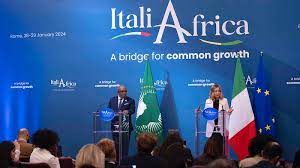Italy: Unlocking the deeper potential of Mattei Plan

Rome: Words matter. If it is true that “Africa is a continent that can and must always amaze,” as Italian Prime Minister Giorgia Meloni said in her opening speech at Monday’s Italy-Africa Conference, it is equally true that “it is urgent to move from words to deeds,” as African Union President Moussa Faki later noted. That requires mutual trust – the ultimate aim of that event, Italy’s first international meeting of the year in its capacity as G-7 president.

Africa “puts a lot of hope” in Italy’s hand on the G-7 steering wheel, added the AU’s rotating president, Comorian Azali Assoumani, noting that the day’s work highlighted Rome’s renewed commitment to Africa – taking the form of the so-called Mattei Plan, its flagship foreign policy initiative.
The pathway to trust. In an era of complex geopolitical interplay and rising insecurity, the wider European Union was looking closely to Italy’s manoeuvres, as signified by the presence of the three key presidents – the Commission’s Ursula von der Leyen, the Council’s Charles Michel, Parliament’s Roberta Metsola. In expressing his satisfaction for this degree of attention, President Faki also sought to emphasise the need for mutual respect as the building block of trust.
That includes understanding that African countries seek to remain multipolar and free to choose their partner, refraining from aligning to a single geopolitical bloc – a concept African audiences take for granted, and EU ones have struggled with.
“Just as we do not impose, we do not want choices to be imposed on us,” he said.
Redefining the EU-Africa balance. Part of the message seems to be getting through to Western audiences. In affirming that respect and trust fuel cooperation, Mr Michel emphasised that Italy’s Mattei Plan is “part of a philosophy of relations that we want to weave with Africa – and it’s based on “concrete projects, not only grand speeches.”
He then identified three key areas of operation, all laid out in practice in the Italian project: security and peace; prosperity, with Ms von der Leyen identifying “energy and training” as the core drivers; combating illegal immigration through a renewed commitment to legal entry channels.
The expert’s take. The Mattei Plan’s “scaffolding,” both in terms of contents and narrative, “is valid,” said Arturo Varvelli, director of the European Council on Foreign Relations’ Rome office, to our sister website. “Not least because it avoids stressing the exceptionality of [Italy’s] offer,” in keeping with the awareness that it’s one of the many in such a competitive world. Crucially, this right-sizing of expectations allows Rome’s project “to be represented as feasible,” he stressed.
“We are not thinking of changing the fate of relations between Europe and Africa, but we are offering something concrete. And you can see that the Italian government has worked with companies on this, acquiring a pragmatic vision.”
It also responds to a set of African concerns. Even though the resources are (initially) limited to just over 5 billion dollars, allocating them to targeted projects helps with the plan’s feasibility. “Now it remains to be understood how the individual projects are part of a broad strategy of our country,” stressed the expert.
Call it Global Gateway? Mr Varvelli’s overall perception of the Mattei Plan is positive, even if its reach is limited compared to the EU’s international outreach programme – which has earmarked as much as €150 billion for the African continent. Will the Italian effort be folded into it? The expert believes that “coordination mechanisms will be found,” as it would be best for the Mattei Plan “to act as an integration, or perhaps as a towing, of the Global Gateway.”





